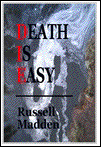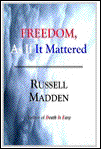 |
 |
|
|
 |
 |
|
|
F. Paul Wilson's popular character, Repairman Jack, continues his adventures in All the Rage. First introduced in The Tomb, Jack exists in the interstices of society. Eschewing social security number, income taxes, driver's license, or any other interaction with the State that might allow it a hook into his life, Jack exists for his own sake and at his own pleasure. He enjoys a few close friends, but he largely wends his way through the world following his private code of justice, a set of principles more exacting than the formal laws ensnaring his fellow citizens.
In the Wilson chronology, All the Rage follows the events chronicled in Legacies and Conspiracies. Eventually, we may learn what other travails Jack must endure before he confronts the cosmic Armageddon depicted in Nightworld. In the meantime, we can enjoy Jack in this novel as he brushes again with agents of the "Otherness" that almost claimed his life in Conspiracies. Before he is done, he must also do battle once more with a nemesis that nearly defeated him in The Tomb.
In this outing, he is contacted by Dr. Nadia Radzminsky, a research endocrinologist, who suspects that her employer, Dr. Luc Monnet, is being threatened by a Serbian mobster, Milos Dragovic. As Jack unravels the tangled threads connecting these disparate players, he discovers the truth about a "preppy riot" at the New York Metropolitan Museum of Art that nearly cost him the lives of his girlfriend, Gia, and her eight-year-old daughter, Vicky (or Vicks, as he is wont to call her).
A new designer drug, Berzerk (sic), has infiltrated all levels of society, from criminal gangs to white-collar businessmen. Promising a euphoric sense of limitless power, Berzerk assures that extra edge needed to achieve success in today's highly competitive society. Unfortunately, Berzerk can also unleash more primitive and violent aspects of our psyches, as well.
In digging through the less seemly elements of the city, Jack enlists the aid of the delightfully eccentric, Abe Grossman, who runs Isher Sports Shop. Anyone familiar with the late science fiction writer A. E. Van Vogt will recognize "Isher" as an homage to The Weapon Shops of Isher. (Van Vogt's gunshop sports a sign that proudly states, "The Right to Buy Weapons is the Right to be Free," a sentiment Abe fully shares.)
Small touches such as these help make All the Rage (and many other Wilson novels) especially fun and appropriate for readers sympathetic to freedom and personal responsibility. Indeed, a recurrent theme for Wilson is the idea of control, both personal and cultural. This core idea is presented more explicitly here than in other books by Wilson. Control -- and its opposite, loss of control -- struggle with yin and yang duality both in the plot and within Jack's soul. Further amplifying this duality and opposition is the fact that control and its antithesis are to be either welcomed and embraced or despised and feared depending upon the context.
In Jack's relationship to society, control (by impersonal others [or Others?]) is abhorrent and to be avoided at all costs. Jack's attitude to much of the entangling webs created by the State is summed up in this passage revealing how he feels about that "certainty" of life, taxes:
Such thoughts comport nicely with such liberty-oriented writers as Ayn Rand. Rand often made the point that time is the one thing you have in limited supply. Unfortunately, you never know how much remains to you. Thus to surrender even a second of your existence to undeserving others is to sacrifice -- to lose -- what forms the foundation for all your other values: your life itself. In Atlas Shrugged, she encapsulated this principle in the famous oath sworn to by all the societal deserters who joined John Galt in Atlantis: "I swear -- by my life and my love for it -- that I will never live for the sake of another man, nor ask another man to live for mine." (p. 993)
Jack also echoes a theme I developed in my essay, "One Freedom." In a very real sense, there are no degrees of freedom. You are either free or you are not. Today, we all suffer from various levels of slavery, a fact I think Jack would recognize. Once the collar has been slipped around your throat, it no longer matters in any fundamental sense how long or how slack the leash might be. As Jack says, by then, "you've already lost the war."
The "takers" mentioned by Jack are exemplified by the thoughts of Vuk Vujovic, one of Dragovic's gang members. In reminiscing about his time as a soldier in the Balkans, he thinks:
In the famous words of Lord Acton, the "takers" cannot help but be corrupted once they cross the line into illicit power over the lives of other autonomous individuals. While Vuk exhibits this trait on a small scale, his boss, Dragovic, exemplifies that exponential decay that accompanies ever-larger spheres of influence and control. Dragovic does, perhaps, retain some twisted sense of proportion and tarnished honor by personally doing some of his dirty work. As Jack points out, however, the urbane politicians who play games with others' lives deserve no such allowances or grudging respect.
After meeting an old army veteran vainly seeking a proper Memorial Day parade, Jack makes an observation to his girlfriend, Gia:
Those who draft innocent civilians to die in foreign lands for no good reasons are high on a drug that puts Berzerk to shame. After all, hundreds of millions of people died last century in vain attempts to satisfy the power lust of their so-called leaders. The victims of Berzerk are, at least, few in number and face their killers one-on-one.
As for those who decide to "enhance" their psyches via this new drug:
This serves as an example of the other half of the "control" equation. The issue of illicit drugs bridges the gap between social control and personal control. While the politicians endeavor -- fruitlessly -- to squelch consumption of such chemicals, the pervasive popularity of banned drugs testifies to the desires of many citizens to experience a temporary loss of their personal inhibitions. While Jack eschews such artificial mental alterations (beyond the effects of alcohol), he wrestles with his own non-chemical version of Berzerk.
Here, the title of Wilson's book serves double-duty. On the one hand, "all the rage" can refer to the latest drug fad, Berzerk, one sought by an ever-increasing number of people. On the other hand, "all the rage" describes the ultimate result of Berzerk. Under normal circumstances, individuals suppress (or repress) their violent tendencies. Most people have uttered such words as, "I'd like to kill that guy," on one occasion or another. But rarely does anyone act upon such dark impulses. Berzerk, however, unleashes all that pent-up rage, all the rabid savagery, all the primitive brutality that bubbles to the surface in times of stress. None of that berserk ferociousness we share with the lower animals is held in abeyance when a user of Berzerk is riding his high.
For Jack, "all the rage" describes the loss of control that began his career as a "fixer" of unfixable situations. He recognizes only too well the depths of the wild viciousness percolating deep within his hidden self. When he opens the bars to the cage locking away that deep-seated rage, he walks a tightrope. The risk of running amok is one he must accept to accomplish his goals. Shocking though his behavior can be at times to others, he essentially calls upon such carefully "controlled uncontrollability" to see him through dangerous confrontations with those he aims to best. Self-contradictory though "confined chaos" might appear, Jack manages to bend that prowling tiger to his will.
In All the Rage, however, he faces his biggest challenge to that success. How he handles this obstacle to his personal control offers the reader a fascinating glimpse into Jack's darker side.
For anyone familiar with Repairman Jack, All the Rage serves as a satisfying continuation of this hero's adventures. For anyone who has yet to make this character's acquaintance, F. Paul Wilson's latest entry provides a worthwhile introduction to a man whose life we all might envy on occasion.